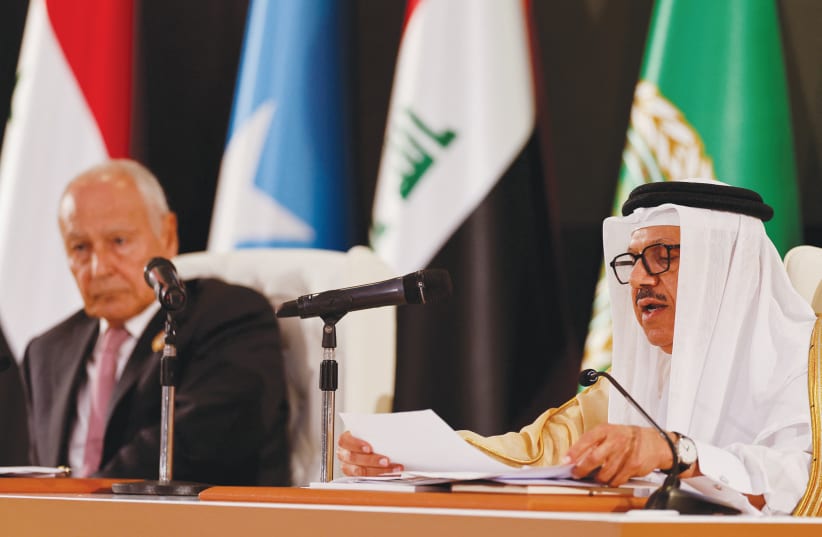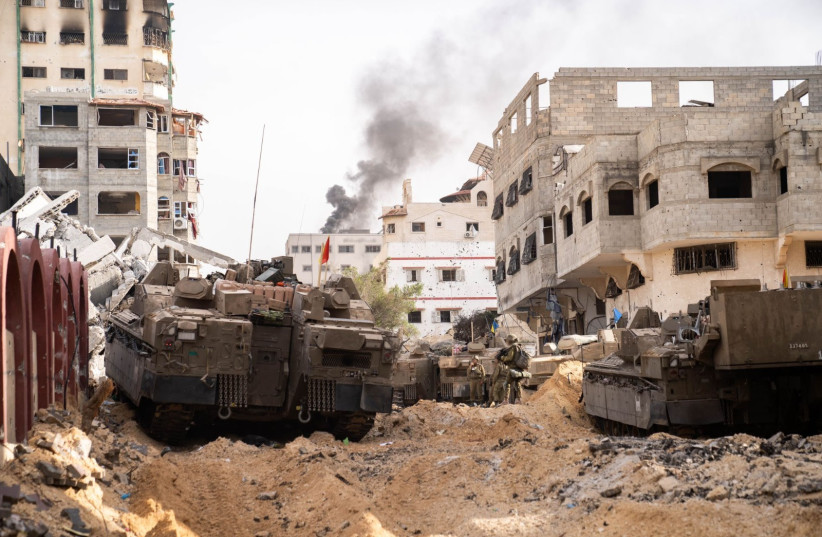After months of political indecision regarding Gaza’s future, due in part to extremists within Israel’s governing coalition, broaching the topic of the Strip’s next leadership is now unavoidable. That is, it seems, unavoidable to all but Prime Minister Benjamin Netanyahu. After withdrawing most of its ground forces earlier this year, the IDF has redeployed significant manpower into central and northern Gaza to dismantle resurgent Hamas infrastructure in Jabalya and Zeitun. Several Israeli soldiers were killed or wounded recently in areas that were cleared of Hamas months ago.
The demoralizing reality of intensive combat in areas previously cleared of Hamas has motivated IDF Spokesperson R.-Adm. Daniel Hagari to emphatically declare that “A governmental alternative to Hamas would put create pressure on Hamas, but that is a question for the political echelon.”
Defense Minister Yoav Gallant issued a public plea, stating more directly: “I call on Prime Minister Benjamin Netanyahu to make a decision and declare that Israel will not establish civilian control over the Gaza Strip...”
Last night, in a dramatic address, war cabinet member MK Benny Gantz also added pressure by giving Netanyahu an ultimatum: Propose a tangible strategy for Gaza’s future by June 8, or his National Unity party would dissolve the unity government – leaving the prime minister still likely secure with his 64-seat coalition.
The coalition’s far-Right partners have established that they wish to see Israeli rule in Gaza, but outright Jewish settlement and the emigration of large swathes of Palestinians.
While not endorsing this vision, Netanyahu has persisted in insisting that he does not want the Palestinian Authority (PA) to rule the Gaza Strip. Netanyahu’s only recent reference to possible governance in post-war Gaza was a declaration of the need for Saudi and Emirati support during an interview with Dr. Phil.
Despite mounting fatalities, waning international support, and pleas from the IDF, the defense minister, and Gantz, a concrete plan for Gaza’s future remains beyond the Israeli cabinet’s agenda. Hopefully, pressure from all the above will wake Netanyahu from political paralysis to this urgent need.
The Manama Declaration
While Israel’s government remains in turmoil, at best, and utter denial, at worst, the Arab League met this week and released the Manama Declaration on Thursday. This declaration both closely aligns with Western regional interests and approaches Israel with the utmost pragmatism, demonstrating the level of acceptance of Israel in the region, despite the now seven months long war with Hamas.
The Manama Declaration contains numerous efficacious clauses, including condemning Houthi attacks on Red Sea shipping vessels and reaffirming the Palestinian Liberation Organization (PLO) as the sole representative of the Palestinian people. Though receiving virtually no coverage in Israel, it offers the most practical solution for Gaza’s short term future – and elaborates an alternative to Israeli control of the Strip without PA rule in phase one.
Ultimately, the declaration clears a significant barrier in creating a stable future for Gaza. Arab states could find it difficult to accept an Israeli request for their involvement in Gaza via a Dr. Phil interview, however, an Arab-nation-initiated solution is far more appealing.
Most importantly, the Manama Declaration calls for a United Nations peacekeeping force to operate in the West Bank, East Jerusalem, and Gaza until a two-state solution is attained. While a UN presence in the West Bank and Jerusalem will undoubtedly be rejected by any Israeli government, a UN peacekeeping force in Gaza initiated by Arab states – coupled with acknowledging that a sovereign Palestinian state will not materialize “tomorrow” – does not negate any of Netanyahu’s declared “No’s.”
In fact, this proposal includes some of his “Yes’s.”
Critically, Israel could petition for the gradual introduction of a UN peacekeeping force, which would allow it to continue its operation in Rafah and, hopefully, negotiate for the release of hostages. If a peacekeeping force were to be deployed in the center and North of Gaza, these objectives could still be achieved while preventing a Hamas rebound.
An Arab-backed UN peacekeeping mission would eventually allow Israel to withdraw ground troops from Gaza, ending the intensive combat phase of the war. It also leaves opportunities for non-PA-led governance in the short term, which would allow Netanyahu to fulfill his promises and allow his far-Right coalition partners to save face. A UN force in Gaza would also allow time to foster a stable Palestinian government in the long term – and does not negate any of Gantz’s notions either.
THE DECLARATION addresses the concerns of mainstream Israelis and their international partners. Its proposals would save Israeli soldiers’ lives, further engage regional and global stakeholders in Gaza’s future, and allow Israel to follow a regional vision for its problems that does not negate its own needs.
It also lays the early groundwork for a prosperous and de-radicalized Palestinian society, supported by pragmatic Arab States, a prerequisite for sustainable resolutions to the Israeli-Palestinian conflict.
In the new reality created by the Abraham Accords, Israel has the option to work with its regional partners to begin solving the disaster created by Hamas on October 7. The Manama Declaration remains the best solution to date. For Israel’s government to dismiss it would be foolish.
The writer is co-founder of the Emma Lazarus Institute, a think-tank forging shared values between the democratic West and moderate East. He is also CEO of Potomac Strategy, a consultancy advising clients, including GCC governments, on geopolitics, public safety, and international cooperation.

